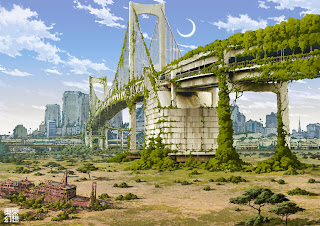Monday, April 22, 2024
Poison Ivy helps us celebrate Earth Day 2024
Saturday, April 13, 2024
Sunday, December 31, 2023
Staring into the Year End Campfire
When I set out to find the perfect Western, Biden was a
Vice-President, Putin was a Prime Minister, Ukraine was a Russian client-state,
Trump was a game show host, I had a heart that was 100% natural, and had never
heard of the eight limbs of ashtanga yoga.
A lot has changed since then.
In those days, and the couple of years that followed, I spent
a lot of meandering mental energy thinking about man in nature, the folly of
civilization, completely ignored Hobbes, and longed for some kind of Tyler
Durden-esque collapse of the status quo that would certainly have killed me
within days.
(Side note: you know how life expectancies were so low back in
ye olden days? It wasn’t because
everyone died at 35, it was because so many people died of things that we can
prevent or manage today. If I were born
50 years earlier I would not have lived past 40, and probably would have had
trouble making it to my 20’s. A friend
asked me mid-pandemic why I was so cranky and depressed all the time and that
it was bringing down all my co-workers.
I said that if the Qanon-MAGA hat crowd decides they don’t like the
election results and start a civil war I’ve got 60 days max before a disrupted
pharma supply chain kills me. He thought
that was ridiculous, then we had Jan 6.
He also occasionally read this blog.
Hi RC!)
Several times I’ve set out to make a Dungeons and Dragons character
that felt like a Saddhu, the ascetic wandering yogis that still exist
today. My buddies assume that I’d make a
monk, but the times where I’ve done it I’ve always made some kind of
Druid.
Yoga, particularly Shaivist Tantra yoga I study, is pretty
primal. You can’t really experience it
unless you can experience it in your body first. Not that you’ve got to be a super athlete; I
started my study without a sternum, not a lot of complicated yoga postures
happening at that time. The quintessential
yogi for me is Shiva- one of the three faces of God, Lord of Yoga, sitting on a
mountain, meditating and surrounded by animals.
That ascetic, austere seeker going to the mountains to
meditate always appealed to me. Why do
people go to find enlightenment on top of a mountain? Because you are never the same person at the
top that you were at the start. I even wrote about that way back in 2013.
Just this week I got thinking about this chain:
The Saddhu, seeking a quiet perch on a mountaintop to
meditate.
The Druid, wandering the expansive forests and mountains of
Britain getting list in vision of the Otherworld.
The Mountain Man, leaving the civilization that defined him
to live apart from societal binds and expectations.
The Saddhu, the Druid, the Mountain Man, all connected.
Happy New Year. Time for one last hike.
Thursday, May 28, 2015
The Fine Cinema of Mad Max: Fury Road
 The Australian Outback after a nuclear
and biological disaster is dominated by three city-states, each of which
controls one vital resource- food, fuel, or ammunition. As part of a
periodic exchange of goods one of these city-states, the Citadel, manages a heavily guarded merchant
caravan that connects the three city-states. Despite being the best
source of water (via a well-pressured underground spring) and food, the Citadel
struggles with radiation and birth defects among its population. The
leader of the Citadel manages the social tensions generated by these birth
defects in three ways. First, by enslaving healthy men and using them as
living blood banks. Second, by enslaving healthy women to act as brood mothers
in hopes of birthing a generation of fit children. Finally, by creating a
Norse-inspired cult that reveres death in combat before succumbing to
radiation-linked diseases.
The Australian Outback after a nuclear
and biological disaster is dominated by three city-states, each of which
controls one vital resource- food, fuel, or ammunition. As part of a
periodic exchange of goods one of these city-states, the Citadel, manages a heavily guarded merchant
caravan that connects the three city-states. Despite being the best
source of water (via a well-pressured underground spring) and food, the Citadel
struggles with radiation and birth defects among its population. The
leader of the Citadel manages the social tensions generated by these birth
defects in three ways. First, by enslaving healthy men and using them as
living blood banks. Second, by enslaving healthy women to act as brood mothers
in hopes of birthing a generation of fit children. Finally, by creating a
Norse-inspired cult that reveres death in combat before succumbing to
radiation-linked diseases.Wednesday, February 8, 2012
Alex Mercer, Tyler Durden, and Post-Urbanism
 |
| image by Phil Noto |
 |
| The thing that was Alex Mercer in action |






_kindlephoto-140457927.jpg)

.jpg)
%20-%20T05_0014_kindlephoto-53413737.jpg)









